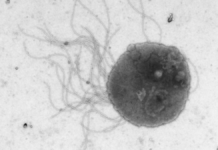Last December, the Institute where I work at changed out the coffee machines in the cafeteria and the replacement drinks were utterly disgusting. My team and I were soon tempted by the idea of getting our own personal coffee machine. We could not resist buying it. This new coffee machine is attractive, compact and best of all makes great coffee, but there is a downside: it’s one of these newer single serving coffee-makers with individual capsules or pods. It’s a nice concept until we realized that only one brand’s pods are recyclable in Switzerland, and it is definitely not ours. In this country, each used pod would end up in the incinerator! This is a staggering amount of waste in a place where the average person drinks 1,300 cups of coffee yearly.
As someone who strives to only use reusable and recyclable items, this was a major problem. A catastrophe growing by one exhausted pod at a time. I was just about ready to get out a whip and chastise myself, but instead I opted for another form of punishment which involved tedious research on how to disassemble, reuse, and recycle most components of the pods or capsules. One must only peel off the thin film, separate the different plastics from the aluminum foil and the coffee grounds. Plastics would be brought to my hometown, where recycling of plastics is advanced, the aluminum bits would be deposited at local recycling points, and the coffee grounds would make a perfect body scrub. It would be time consuming, but worth it. I felt proud of myself.
One of my colleagues, originally from Hamburg, always joked about this sort of thing, but lately he has confessed that he has begun to feel guilty about his coffee-pod-based ecological footprint. In his hometown, coffee pods have just been banned from public offices. This news was so unsettling to my German friend that now he always helps me disassemble the pods; and he does so exclaiming how happy he is that dolphins are not dying with his coffee pods in their throats.
One part guilt, one part pride.
We all know that our feelings affect our everyday actions, and vice versa. Yet, we haven’t much of a clue as to how or why. Most of the time it translates into shouting at your partner for no real reason, or spontaneously bringing a cake at work. But what if this interconnectedness of emotion and action could have a bigger impact, on, say, climate change?
A research team from the University of Queensland recently investigated the relationship between the emotions of pride and guilt and eco-friendly behavior. The study participants were all Australian university students, (61 female and 35 male), and therefore represent one the most consistently pro-environment communities. In fact, geographical origins, education, and sex influences our personal environmental perspective. The research team observed 65% of participants had feelings of pride after doing something eco-friendly. In addition, the more people perceived that their communities are involved in pro-environment actions, the more pride they feel when engaged in such activities. After all, we like being legitimized by our peers.
Guilt can also be an effective tool, as evidenced by the route my colleague took to eco-consciousness. Though, guilt, by itself, does not seem to push us to “do better next time” as well as it should, as the study indicates. Nonetheless, we can see how frequently environmental campaigns’ slogans are based on this very principle, stressing that it is entirely our fault that the Earth is dying and that the situation is grim. Recall the Brandalism artworks installed across Paris before the launch of the UN COP21 Climate Conference. It’s reminiscent of the oppressive sense of sin, shame and guilt that pervaded medieval Christianity. The difference is that nowadays we know that self-chastising is not going to solve any problems. Instead, might we positively engage the already guilty feeling communities and recognize their pro-environment achievements? Perhaps it is time we take a fresh look at how we structure ecological initiatives and how we can use our own human nature of wanting to be legitimized by the tribe to do some real good for the planet.
We all feel guilty on varying levels: but if this guilt alone is not enough to enact any change, we’d be silly to keep trying to guilt ourselves into recycling our old coffee pods. In reality, a healthier approach would be to recycle the pods with somebody else. In this way we could challenge each other: you are doing great recycling these coffee pods, but what if we could get everybody to use a percolator next time?
Source:
Bissing-Olson, M., Fielding, K., & Iyer, A. (2016). Experiences of pride, not guilt, predict pro-environmental behavior when pro-environmental descriptive norms are more positive Journal of Environmental Psychology, 45, 145-153 DOI: 10.1016/j.jenvp.2016.01.001





